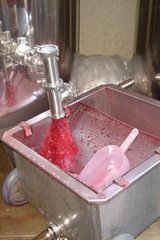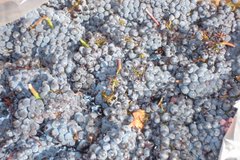 From the vine, came the grape
From the vine, came the grape
Valentino Vineyards & Winery carries on wine-making tradition in Long Grove
August 22, 2007
BY LONG HWA-shu
Award-winning wines from Long Grove?
You'll be surprised. Valentino Vineyards & Winery at 5175 Aplakisic Road has won over 30 medals, including three this year, since it opened in 2001.
A sampling of the wines offered at the Valentino Vineyards & Winery in Long Grove.
"They include gold, silver and bronze medals, and Best of Class, from Illinois state competition and the Indianapolis International Competition," said Rudoph Valentino DiTommaso, owner.
DiTommaso makes over 20 different wines, including Marechal Foch, Seyval Blanc, Pinot Grigio, Merlot and his signature blend, a red. He produces 12,000 bottles a year. They are sold to restaurants and specialty stores, as well as to the general public from his winery where he holds tastings.
A wine-tasting is currently conducted at the
Mambo Italiano restaurant in Mundelein, he said.
The Napa Valley north of San Francisco is known as the wine country. But out here, in his 20-acre vineyard in Long Grove, DiTommaso said the soil and the climate are just as well.
"The soil conditions here are good, sandy with a high ph. We have nice, hot summer days. At night it cools off in the 60s. They are very good for growing grapes," he said, noting that the climate here is similar to some parts in Italy where fine wines are made.
The DiTommaso family has a wine-making tradition, starting from his grandparents, immigrants from Italy.
"I began helping my grandparents making wine in Chicago when I was 8," he recalls.
He began making wine on his own when he was 28 in Buffalo Grove. "My neighbor gave me some grapes from vines in his backyard. I made some red wine and gave it to them and friends. They liked it. That's how I got started."
DiTommaso bought the land, a former nursery, in Long Grove in 1990, and started growing vines from cuttings given to him by Dr. Will Enders who has a vineyard in Port Byron, Ill. He also bought grafted vines from a nursery in upstate New York. The vineyard, with 6,000 vines, boasts 19 grape varieties with Marechal Foch the dominant variety.
"We harvested 30,000 pounds of grapes in 2005. For this year, harvesting will begin next week," said DiTommaso, who employs two full-time workers plus several part-timers.
Both he and his daughter Briana Valentino, a wine maker, work full-time at the business. She also has her own blend, a white wine under the Valentina name which, he said, is selling very well.
"Two thousand seven will be a good year. It has been dry and now it is finishing off with rain," he said, adding: "We never had a bad year."
Growing grapes and making wines, DiTommaso acknowledges is a lot of hard work. "But I enjoy it. I wouldn't be doing this otherwise," he said.
And there's room for expansion. "I can grow another 6,000 vines here," he added.
Valentino Vineyards & Winery has also become a tourist attraction with tours which cost $5 per person and wine tasting at $8, which includes 5 wines. Tasters get to keep a glass etched with the company name.
Tastings are from 5 to 9 p.m. Friday; 11 a.m. to 5 p.m. Saturday; and noon to 4 p.m. Sunday. There's no need to call or make reservations. Groups of 20 or more people who want to visit weekdays, should call in advance at (847) 634-2831.






























